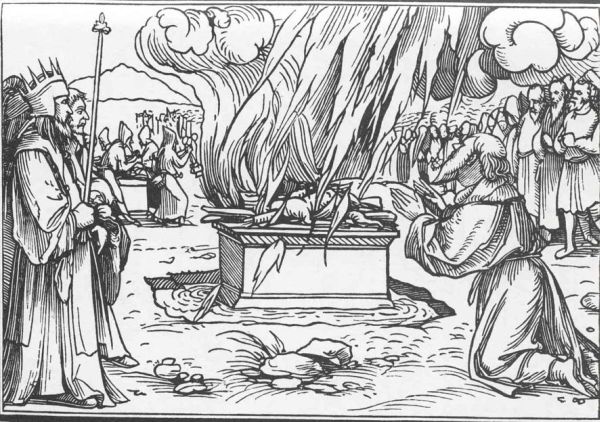Scripture readings: 2 Sam. 6:1-5, 12b-19; Ps. 85:8-13; Eph. 1:3-14; Mark 6:14-29 Sermon by Linda Rex from Eph. 1:3-4; Mark 6:14-29
When God Judges
Elijah’s story
One of the Bible stories I remember from my childhood is one about the prophet Elijah and the prophets of Baal meeting on Mount Carmel with the people of Israel. Elijah made fun of the pagan prophets and their futile efforts to get God to bring down fire on their altars. Then he dug a trench around the altar and poured water all over it and the sacrifice he had put on it. Then Elijah asked God to prove he was indeed the God of Israel by bringing fire down on the water-soaked altar. Apparently God was more than happy to do so, because he sent fire which not only consumed the offering on the altar—it also consumed the stones of the altar and the water pooled in the now-muddy ditch.

(public domain via Wikimedia Commons)
Who is Jesus?
Elijah was a great prophet the people of Israel held in great esteem. When Jesus came on the scene and began doing miracles, people would sometimes say that he was Elijah returned to life. Some people compared Jesus with other prophets of old. Others said he was the prophet Moses returned to life.
When a person encountered Jesus, they would come up against a question which they invariably struggled to answer: Just who is this Jesus? Now, many centuries later, you and I face the same question. Just as it was important back then, it is important now that we understand who Jesus is and what he has to say about who we are.
John the Baptizer and Herod
The tetrarch Herod Antipas (called “King Herod” in the Gospels) came up against this question when he began hearing rumors about Jesus and his disciples doing miracles, casting out demons, and teaching the people in his jurisdiction, which included the region of Galilee. His first guess was that Jesus was John the Baptizer risen from the dead. He figured that was how Jesus managed to have healing powers and do miracles.

John the Baptizer was not a happy memory for Herod. John had loudly criticized Herod’s adulterous and incestuous relationship with his second wife, Herodias. Herod had John executed in order to keep an oath he made to Herodias’ daughter while he was drunk in the company of religious, military, and civic leaders. Herod’s sense of guilt was the lens through which he viewed Jesus. He surmised that God was going to make him pay for what he had done to John.
The lens through which we view God affects our ability to see clearly who he is. If we view him through the lens of our guilt and shame, we will tend to see God as judgmental and condemning—a deity whose goal is to make us pay for every wrong we have committed.
Herod was a violent, murderous despot who was heavily influenced by his scheming wife. Herodias plotted to force Herod’s hand so he would have to kill rather than protect John. In many ways she was like queen Jezebel of Elijah’s day. Her evil, twisted efforts to manipulate and control Herod and thus the people he ruled, became more and more evident over time. Eventually, she influenced Herod to ask to be made supreme ruler of his portion of Roman territory. As a result, they both ended up in exile and eventually were killed for what was seen as treason.
What Herod and Herodias deserved was God’s judgment, right? They deserved to be punished for the evil they inflicted, correct? They should have had to answer to God, shouldn’t they? Perhaps God should have sent down fire from heaven to consume them. Maybe he should have sent them to burn forever in a fiery hell, right?
How does God judge evil?
Well, what about that? How does God judge evil people who clearly deserve condemnation and punishment? The gospel answer is that God’s judgment on such evil, such sin, is none other than Jesus Christ himself. Jesus is God’s declaration of his Word to humanity—his declaration that he will allow nothing to stand between us and himself. In Christ, God has said to us that we are forgiven, accepted, and beloved. In Christ, God has declared that there is only one Way, one Truth, and one Life—and it is not us—it is his Son, Jesus Christ, God in human flesh. Jesus is God’s judgment on sin. Note what Paul says in Ephesians:
[God] chose us in him [Christ] before the foundation of the world, that we would be holy and blameless before Him. (Eph. 1:4, NASB)
Before the foundation of the world, God knew of our fallen nature and its bent toward sin and evil. Knowing we would not be holy, nor blameless, before the foundation of the world, God chose us in his Son Jesus Christ. In choosing his Son to be our Savior, God chose us—each human being who has ever lived—to be holy and blameless before him. It was God’s judgment that there would only be one true human existence for you and for me, and it would be in his Son Jesus Christ. Paul continues:
In love He predestined us to adoption as sons through Jesus Christ to Himself, according to the kind intention of His will, to the praise of the glory of His grace, which He freely bestowed on us in the Beloved.” (Eph. 1:4-6, NASB)
God so loved the world that he gave his Son Jesus Christ (John 3:16), planning from before time to adopt each of us in and through his Son. It was preordained that Jesus, who is both fully God and fully human, would be the means by which we would be able to share in the perfect relationship that Jesus has with the Father. Our being included with Jesus in his family relationship with his Father occurs in a way that Paul refers to as our “adoption.” As adopted children of God, we are able to participate, in Christ, by the Spirit, in God’s own tri-personal love and life.
Jesus came to save, not condemn
Contrary to what Herod may have anticipated from God, Jesus did not come to condemn Herod or any other sinner. Jesus said that his Abba did not send him into the world to condemn the world, but to save it (John 3:17). Jesus demonstrated his purpose for coming by freeing people from slavery to illness, to death and to demon possession. By his loving, compassionate care of each person he met, Jesus showed that his purpose was to love the world—to demonstrate in tangible ways the care, concern and gracious, compassionate love that God has for all people.
In Ephesians, Paul goes on to say that God freely bestowed on us great grace:
In Him we have redemption through His blood, the forgiveness of our trespasses, according to the riches of His grace which He lavished on us. (Eph. 1:7-8, NASB)
God was not stingy with his grace. He does not begrudge any of us his grace—not even evil people like Herod and Herodias. What God has done for us in his Son Jesus Christ, is to eliminate once and for all the power and control of sin and evil. In and through Christ, God has conquered sin, evil, and death itself. All these are defeated foes that no longer hold full-sway in this world. Yes, for the time being, they still impact us. But, they have lost their power and, ultimately, there will be no place for them in the kingdom of God. They will end up being cast into the lake of fire, which is symbolic of God’s final judgment on sin, evil and death.
We need to come to terms with who Jesus is. He is God’s Word expressed to us in a way we can understand. Jesus is the love of God in person. We must learn to view God through the lens of his Son Jesus. The Son of God incarnate, crucified, resurrected and ascended, is God’s Word of love and grace to us, expressed in a way we can grab hold of and trust in.
God in human flesh in the Person of Jesus Christ is the lens through which we should also view ourselves and one another. We are people who God loves and cares for. Jesus does not condemn us in our sin and frailty. Instead, he actively works, through the Spirit, to renew and transform us. He constantly intercedes for us in prayer, working to draw us deeper into the life and love of the Father, Son and Spirit.
God’s beloved children
As we come to understand, believe in, and receive the perfect love that God has for us—the love he has so clearly shown us in his Son Jesus Christ, we can begin to lose any fear of condemnation. Instead of viewing Jesus and the Father through eyes of guilt and shame, we can begin to see the truth that we are beloved of God in Christ, we are forgiven in the Lamb of God, we are adopted children of God in the Son. This is who we are, in Christ.
Secure in that truth, we can begin to live accordingly as the adopted children of God that we truly are. As we open ourselves to the guidance of the Living Word through the gracious Spirit, we will begin to experience the new life that is ours in our union with Christ. We will no longer be seen as we once were; instead we will be known for the new creations that we are. In Christ, God has made, and is making, all things new. We are part of that renewal of the whole creation.
As we walk with Jesus, in step with the Spirit (and not the flesh) we find ourselves experiencing freedom and renewal rather than shame and guilt. As we keep our eyes on Christ, we come to know him more fully for who he truly is. As we do that, we find ourselves being transformed. It is Christ, by the Spirit, who transforms our hearts by faith.
We won’t need to create a dramatic demonstration to prove that God is the Lord of our lives. God has already proven that in giving his Son Jesus and in sending his Spirit to burn away the stones of sin and unbelief in our hearts. It is God’s Living Water that we need flowing in and through us—and God makes his Spirit abundantly available to us, calling us to faith in God’s Son shown forth in our responsive obedience. We are Abba’s children, and he loves us. What more could we ask for?
Closing prayer
Thank you, Abba, for the perfect gift of your Son Jesus Christ, and the outpouring of your Holy Spirit. Grant us the grace to turn to you and to trust in your love and grace as demonstrated to us in the life, death, resurrection, and ascension of your Son. Free us Lord, from shame and guilt, just as you have freed us from evil, sin and death. We confess our sin, trusting in your promise to cleanse us from all unrighteousness. We trust you, Holy Father, to finish what you have started in us, through Jesus our Lord, and by your Spirit. Amen.



Please note that comments are moderated. Your comment will not appear until it is reviewed.